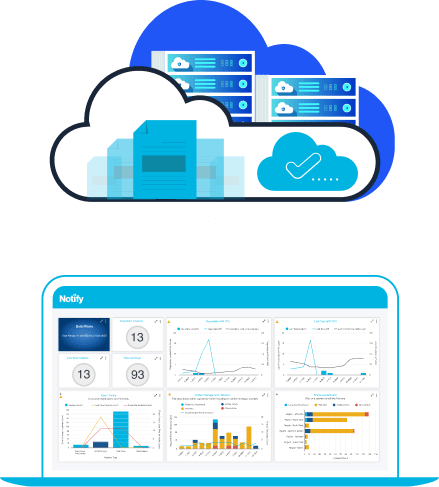Notify Software as a Service Fair Use Policy
Notify provides multi-tenanted SaaS solutions and seeks to ensure and maintain an optimal user experience. Notify is committed to an up-front, published, simple, transparent and no-nonsense subscription pricing model. We don’t set out to tempt customers with low up-front pricing and then “pile on” additional charges for storage etc. We do not charge extra storage costs when the tool is used reasonably and normally. We do however need to ensure that the provision of our services is profitable, as well as fair.
That’s why we monitor technical usage and work according to a Fair Use Policy. This Fair Use Policy has been created to prevent improper use of the software, so we can offer all our customers an excellent user experience. The Fair Use Policy for our SaaS solution comprise storage, traffic, events and compute – this includes for example file storage, database size, the amount of internal and external network traffic including web traffic, the number of events sent from and received by our servers, and the amount of database load and API load – including CPU time, memory use and queue lengths across all services.
Notify does not charge extra costs when the tool is used reasonably and normally. When we determine the scope of Fair Use we take into account your contract, the observed use across all of our users, technical advances and the current price rate of all necessary assets. We’ll adjust these values when there is reasonable cause. In general, this will often mean expansion and raising of thresholds and reducing the cost of excessive use, as a result of lower costs of cloud storage and cloud computing. We will inform you in a timely fashion, when these changes affect your costs or use. When we detect something out of the ordinary in your Notify SaaS environment, we’ll contact you to discuss the situation and potential alternatives. If the situation doesn’t change, may have to limit the available storage, bandwidth, database usage, API usage or allowed emails, for example. Alternatively we may discuss with you options for temporarily isolating your system from other multi-tenanted users.
Storage
Within your SaaS environment you can store documents that help record events like near miss reports, accidents, audit outcomes and other forms of attachments, as well as data and transactions in the database. To make sure that there is enough storage for everyone, we may limit the amount of data you can save. The amount of storage will depend on your type of contract and number of users. We’ve made sure that almost all customers have plenty of disk space when the solutions are used normally. You can always request the actual size of your data storage from our service desk. You can also free up more storage by removing data yourselves, or asking us to help you. If we detect that your organisation structurally saves more data than we consider to be fair and normal, we’ll contact you to discuss the situation. To give an idea on this, we generally consider that a typical client of Notify will require no more than 100GB of data storage. Our software assists with keeping data storage at a fair level by automatically limiting the size and number of individual files that can be attached to events with Notify.
It’s possible to expand your storage and, if appropriate we will only charge a maximum of the published and publicly available Amazon Web Services storage charge for the relevant storage solution plus 20%. At that point we’ll contact you to discuss alternative storage options.
Network Traffic and Bandwidth
To prevent a negative effect of excessive network traffic on your user experience or that of others, we monitor the traffic. We compare your use to the average use of all our SaaS clients with the same contract. With normal use you don’t have to worry about the network bandwidth available to you. If we detect a situation that could lead to a decrease in service, we will contact you to discuss the situation. In some situations, we can intervene by limiting the available bandwidth.
Amount of sent and received emails
To prevent spam, we use worldwide blacklists, and spam blockers among other things. To guarantee smooth email traffic from our SaaS products for you and our other clients, we monitor the mail servers. Spam and blacklisting could happen when excessive amounts of emails are sent from the SaaS environments, for example. We maintain very broad margins based on the average use of our SaaS clients with similar contracts. With normal use, you won’t notice a thing. When we detect abnormal values that could negatively impact the service, we may limit the number of emails you can send, or take other action as appropriate. Before we do this, or in urgent situations immediately after doing so, we’ll always contact you to discuss possible solutions.
Compute and Load
To prevent a negative effect of excessive use of compute resources, on your user experience or that of others, we monitor the compute resources. We compare your use to the average use of all our SaaS clients with the same contract. With normal use you don’t have to worry about the compute services available to you. Where increased usage is caused by the normal growth of users and customers, we will scale the resources available. If we detect a situation that reflects abnormal use or that could lead to a decrease in service, we will contact you to discuss the situation. In some situations, we can intervene by limiting the available compute resource.
Urgent and Extreme Cases
In an urgent or extreme case, for example where services are likely to be significantly impacted, or where we believe your system or ours is under attack (a DDOS – denial of service attack for instance) or where we believe your system or ours has been compromised (for example a hacker or potential a security breach) we may stop the services, or temporarily block your access to them. Before we do this, or in urgent situations immediately after doing so, we’ll always contact you to discuss possible solutions.
In some cases, even without an attack or breach, if your use of the services continues to impact other users, is expected to do so, or is generating costs to us that are not normal when compared to other customers on the same contract and make our service to you unprofitable to maintain, we may isolate your services from the multi-tenanted environments and pass the costs onto you. Before we do this, or in urgent situations immediately after doing so, we’ll always contact you to discuss possible solutions.






































































